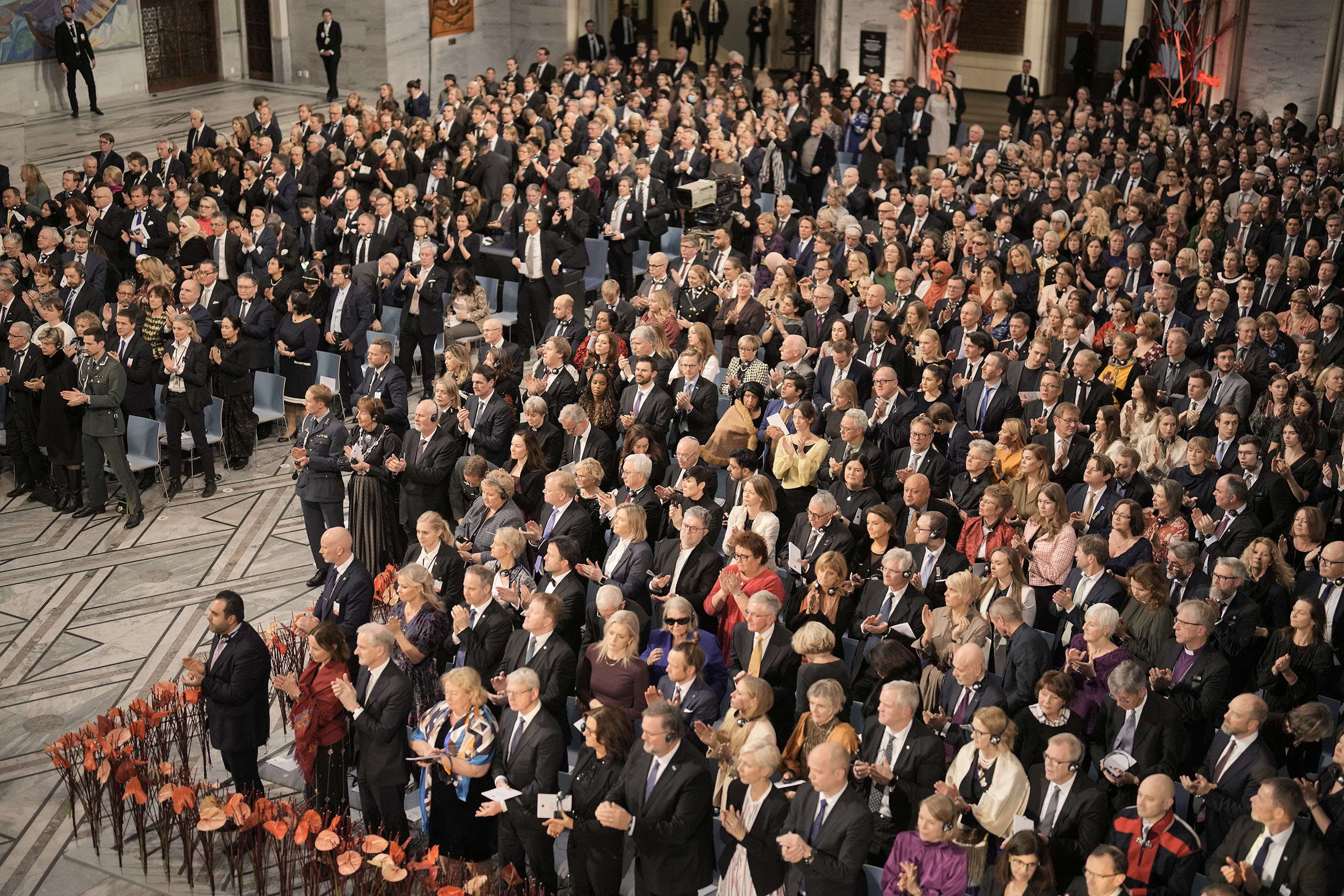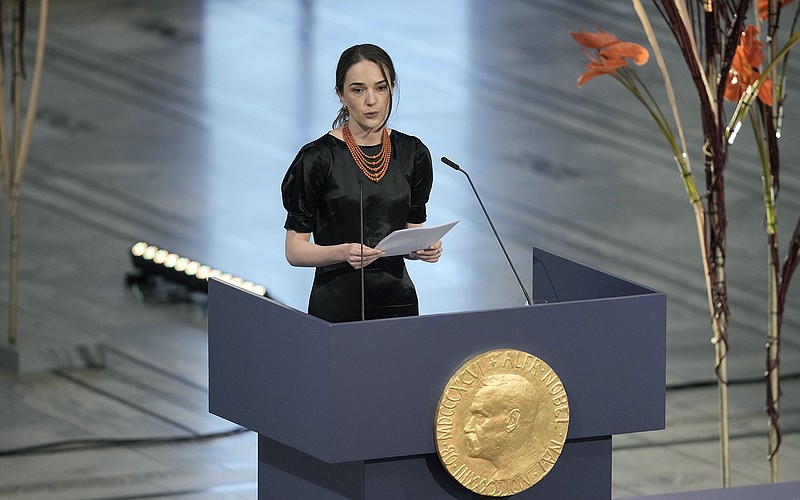KYIV, Ukraine -- The winners of this year's Nobel Peace Prize from Belarus, Russia and Ukraine shared their visions of a fairer world and denounced Russian President Vladimir Putin's war in Ukraine during Saturday's award ceremony in the Norwegian capital.
In an impassioned speech, the laureate from Ukraine seized the moment to make an incongruous but powerful point: At this moment in history, she said, the only way to secure democracy, human rights and a lasting peace in Ukraine is to fight.
"People of Ukraine want peace more than anyone else in the world," said Oleksandra Matviychuk, who accepted the prize on behalf of the Center for Civil Liberties in Ukraine, which she heads. "But peace cannot be reached by a country under attack laying down its arms. This would not be peace, but occupation."
The other two laureates -- Memorial, a Russian research and human-rights organization, and Ales Bialiatski, a jailed Belarusian activist -- have also become symbols of resistance and accountability during the largest ground war in Europe since World War II, set off by Russia's invasion of Ukraine.
Memorial is known for its efforts to uncover the crimes of the Soviet era, but Jan Rachinsky, its chair, who accepted the award for Memorial, said that his organization does more than research and document the tragedies of the past, extending its efforts to the "acute social conflicts of the present."
"What we see as the root cause of these crimes is the sanctification of the Russian state as the supreme value," he said in his speech. "This requires that the absolute priority of power is to serve the 'interests of the state' over the interests of individual human beings and their freedom, dignity and rights."
This "inverted system of values," he said, "prevailed in the Soviet Union for 70 years and, regrettably, continues until today."
In her acceptance speech, Matviychuk said the international system designed after World War II has been severely undermined and called on world leaders to "stop pretending deferred military threats are 'political compromises.'"
"The democratic world has grown accustomed to making concessions to dictatorships," she said. "That is why the willingness of the Ukrainian people to resist Russian imperialism is so important."
A desire for peace does not mean peace at any cost, she said, and her country cannot "leave people in the occupied territories to be killed and tortured."
"People's lives cannot be a 'political compromise,'" she said. "Fighting for peace does not mean yielding to pressure of the aggressor; it means protecting people from its cruelty."
Mykhailo Podolyak, a senior adviser to Ukrainian President Volodymyr Zelenskyy, issued a scathing criticism of the Nobel committee, saying that it had an "interesting understanding of the word 'peace.'"
"Neither Russian nor Belarusian organizations were able to oppose this war," he said in a statement.
The awards were given to send a signal that the conflict in Ukraine must end, Berit Reiss-Andersen, the chair of the Norwegian Nobel Committee, said before the ceremony.
"Sometimes an effort for peace lies with civil society and not with state ambitions alone," she said. "Peace is a wish and achievement that comes with a value that all laureates work for: addressing atrocities, war crimes and rule of law."
She said a disregard for those values was at the core of Russia's war in Ukraine.
"Exactly in these times this is a very important reminder," she said.
'A WAR OF TWO SYSTEMS'
Natalia Pinchuk, the wife of Ales Bialiatski, received the prize on her husband's behalf.
He was detained in Belarus following protests in 2020 against the reelection of the Belarusian President Alexander Lukashenko and remains in jail without trial. He faces up to 12 years in prison if convicted.
"In my homeland, the entirety of Belarus is in a prison," Bialiatski said in the remarks delivered by Pinchuk -- in reference to a sweeping crackdown on the opposition after protests against an August 2020 vote that Lukashenko used to extend his rule. "This award belongs to all my human rights defender friends, all civic activists, tens of thousands of Belarusians who have gone through beatings, torture, arrests, prison."
Lukashenko allowed his country to be used as a staging ground for Russia's invasion of Ukraine, and Russian bombers continue to use Belarusian airspace to launch missile strikes across Ukraine. The massing of Russian soldiers there recently has led to repeated speculation that Belarus may be preparing to intervene in the conflict on the Kremlin's behalf.
Pinchuk said today's political and military events "threaten Belarus with the loss of statehood and independence."
"Unfortunately, the authorities choose to engage with society through the use of force -- grenades, batons, stun guns, endless arrests and torture," she said. "There is no effort or talk about national compromise or dialogue."
It was precisely that kind of violent oppression that Matviychuk said Ukraine was fighting to prevent, framing the war as part of a broader struggle between competing visions of the world.
"This is not a war between two states; it is a war of two systems: authoritarianism and democracy," she said. "We are fighting for the opportunity to build a state in which everyone's rights are protected, authorities are accountable, courts are independent and the police do not beat peaceful student demonstrations in the central square of the capital."
The Nobel prizes for chemistry, physics, medicine, literature and economics were presented later Saturday. After a two-year covid-19 pandemic break, award ceremonies took place at Stockholm's Concert Hall with nearly 1,500 invited guests.
Organizers said there was a record number of prize winners present in Stockholm this year as the Nobel Foundation had invited also those laureates who received the prize in 2020 and 2021 but missed the festivities due to the pandemic.
A brief introduction of each prize subject was followed by a ceremony where King Carl XVI Gustaf of Sweden handed the 2022 Nobel winners their awards complete with fanfares and music by the Royal Stockholm Philharmonic Orchestra.
Information for this article was contributed by Marc Santora of The New York Times and by Markus Schreiber and Jari Tanner of The Associated Press.
 The audience applauds Saturday after Oleksandra Matviychuk’s scathing acceptance speech for the Ukraine Center for Civil Liberties during the Nobel Peace Prize ceremony at City Hall in Oslo, Norway. The Nobel prizes for chemistry, physics, medicine, literature and economics were presented later Saturday. (AP/Markus Schreiber)
The audience applauds Saturday after Oleksandra Matviychuk’s scathing acceptance speech for the Ukraine Center for Civil Liberties during the Nobel Peace Prize ceremony at City Hall in Oslo, Norway. The Nobel prizes for chemistry, physics, medicine, literature and economics were presented later Saturday. (AP/Markus Schreiber)